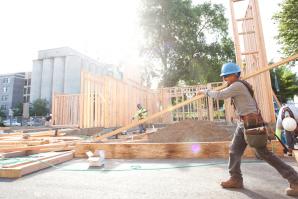Now in the middle of the summer months, energy usage throughout California inevitably has become a significant issue on the minds of millions of residents. Underscoring this reality will, of course, be the sticker shock that many Californians will experience when they open those summertime utility bills.
From the homebuilding industry’s perspective, we have been working diligently for the better part of the last 20 years to design highly energy-efficient homes and to mitigate the financial crunch that homeowners find themselves in when their heating, ventilation and air conditioning (HVAC) systems are working overtime. The reason for this evolution in design is twofold: 1) our industry is committed to being a responsible corporate partner in lessening energy usage and 2) we are responding to consumer tastes, which have shifted heavily toward increased efficiency.
However, homebuilders and consumers are not the only ones thinking about efficiency these days, especially in the Golden State.
In 2015, the California Public Utilities Commission and the California Energy Commission decided to wade into the efficiency debate and did so emphatically, with the release of its Zero Net Energy Action Plan (available for download here). In short, the plan calls for all new homes to be net-zero energy by 2020, which means homebuilders will be legally compelled to produce homes that produce as much energy as they use.
Anytime a government agency comes down with a new regulation, it does take time for an industry to adapt to not only the changes that will happen, but also the challenges certain to arise during this transition period. Fortunately, our industry has been moving in this direction for quite some time.
In my role as vice president of purchasing for Meritage Homes and as chair of the Trade Builder Alliance Council with the North State Building Industry Association, I am heavily involved in energy-efficiency building and continued education for energy use in our industry. The TBAC’s goal is to bring significant timely building knowledge topics to our members. The need for energy code education is necessary and timely because of the significant changes that will shape both existing and future energy policy. For our industry, the most significant change will be the 2019 energy code, Net Zero Energy, designed to be effective for permits pulled on and after Jan. 1, 2020.
The TBAC understands the importance of proactively educating our industry and encouraging homebuilders to be as involved as possible during this transition period. As such, this approach spurred the creation of our “Countdown to 2020” educational seminars. These seminars have opened several lines of communication between regulators and our industry, with the ultimate goal of ensuring we are all on the same page well ahead of 2020.
Consequently, policymakers are asking for feedback from the very individuals charged with implementing their policies. The seminars have effectively engaged manufacturers, suppliers, trade subcontractors, builders, architects, engineers and agencies to work together toward the ultimate goal of producing the most energy-efficient homes in the history of our industry.
My company, Meritage Homes, has led the industry in energy efficiency, having received several awards for our efforts, and I look forward to our continued industry-wide effort to provide homebuyers with the high-efficiency homes they not only desire, but demand.
To learn more about the Zero Net Energy Action Plan, visit californiaznehomes.com.
Recommended For You

Troubles of the Trade
As the Sacramento region fails to meet housing needs, builders scurry to train a much-needed new workforce
The Sacramento Area Council of Governments reported that between 2013 and 2021, the region needs to build about 105,000 housing units to meet demand. Dividing that number by the nine years means almost 12,000 units per year.

Low Inventory Becomes Our New Normal
It’s a seller’s market, and potential homebuyers need to up their game
One of the most pressing topics right now in housing is low inventory. Frankly, there just aren’t enough homes for sale in the Sacramento region, and it’s a problem. If you’ve bought or tried to buy recently, you certainly know this.



